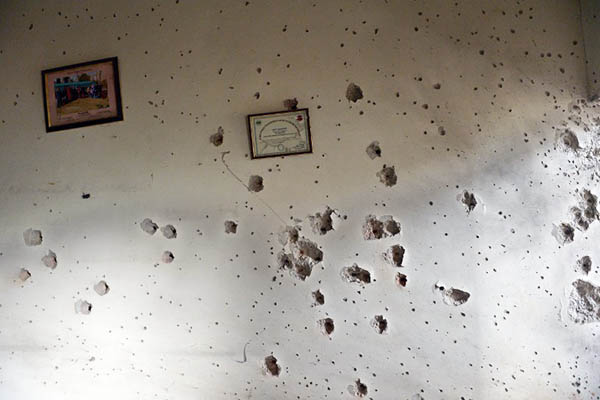
A file photo of the carnage at the Army Public School after the attack by Tehreek-e-Taliban Pakistan militants. A. Majeed—AFP
Made public on the orders of the Supreme Court, the report questions inaction by security guards as attack began
The inquiry commission report into the 2014 Army Public School attack has blamed the delayed and confused response of security forces for the tragedy that resulted in the loss of 144 lives, most of them children.
The 525-page report, authored by Peshawar High Court judge Mohammad Ibrahim Khan, was made public on Friday on the orders of the Supreme Court. According to the report, Pakistan suffered the worst impact of terrorism in 2013-14. “The entry of the terrorists from cross-border (Afghanistan) till infiltration into the doomed school’s perimeter befooling the security apparatus could be attributed to mainly our porous north-west border and Afghan refugees’ movement across the border,” it said.
Referring to the attackers being provided shelter by locals ahead of the assault, the report said that this was “palpable” and “unpardonable.” Judge Khan noted that “when one’s own blood and flesh commit treachery and betrayal, the result would always be devastating.”
He said this act of betrayal “diminished and compromised” the efforts of Pakistan’s security apparatus and “augmented” the accomplishment of the “enemy’s nefarious plan.” In this context, he noted, “no agency [however] capable and able in terms of manpower, infrastructure and technology could outperform the impact of any attack effortlessly when infidels are within the inside.”
The judicial inquiry also slammed the “three layered security protocol,” namely two security patrol vehicles, quick response force located 10 minutes away, and police rapid response force, saying if it had not been distracted, the catastrophe could have suffered fewer losses. One patrol vehicle was “beguiled towards the smoke erupted from the vehicle set ablaze by the terrorists as part of their plan,” it said, noting this had left the school premises unattended and given an “edge” to the militants to break into the premises from the back side.
It noted that while the other patrol vehicle had responded, it alone was not capable of buying the time needed for the rapid response forces to derail the terrorists’ attack.
Referring to a National Counter Terrorism Authority of Pakistan threat alert for “all the academic institutions run by the armed forces,” the report said it had claimed the sole objective was to “target Army families as retribution for the unstoppable and successful military operations against terrorists’ hideouts.” While hailing the security forces’ success against militancy, it said the APS attack had “plagued their success stories, which deserved deification”.
The judicial inquiry also blamed the attack on the “incomparable number of static guards composing the first tier of security apparatus to the level of looming threat,” saying their position was “improper” and compromised the school’s back while focusing on its main entrance. “Equally incomprehensible is the inertia on part of the Askari Guards as well as the deputed Static Guards to the initial heavy firing and blasts by terrorists until the [rapid response forces] had arrived,” it said. “Had they shown a little response and could engage the militants in the very beginning of the attack, the impact of the incident might have been lesser,” the report added.
It, meanwhile, praised the efforts of “valiant soldiers” that had restricted the movement of militants toward the toddlers’ block, “and thus further devastation in that block was foiled.”
Parents’ grievances
The report also collated the grievances of parents who lost their children in the attack, noting they had questioned the delayed response of security forces and the security apparatus that had allowed the militants to bring so many arms and ammunitions with them. Most of the aggrieved families, read the report, complained that police were not allowed to enter the premises, and questioned how the combat operation and evacuation activity could be conducted simultaneously.
Many also complained that accurate information was not shared with them, with their children’s fate only becoming clear late in the day once the bodies were presented for identification. Justice Khan acknowledged that the anguish endured by the bereaved families was beyond imagination but said the efforts of the armed forces in consoling and placating the agonies of the victims’ parents had been better than comparable situations in the rest of the world.
Recommendations
The commission also recommended medical and psychological treatment for the injured, parents and siblings of the deceased, as well as free education for the injured, and guaranteed secondary and higher education for their siblings. Justice Khan said the nation was proud of the sons and daughters who embraced martyrdom in the tragic incident and paid salute to the innocent lives, acknowledging them as the real heroes of Pakistan.
